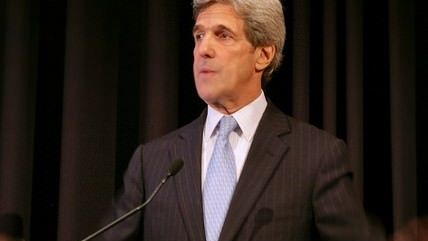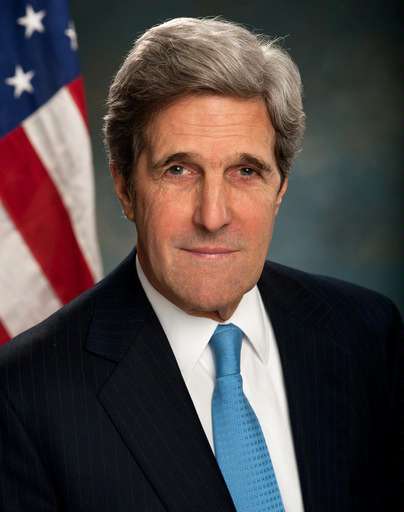Kerry Cites Authorization Obama Said He Would Like To See Repealed To Justify Capture of al-Liby


Secretary of State John Kerry has said that alleged Al Qaeda leader Abu Anas al-Libi was a "legal and an appropriate target for the U.S. military under the Authorization of the Use of Military Force passed in September 2001." Kerry's remarks come a few days after al-Libi, who is suspected of masterminding the 1998 attacks against American African embassies, was seized by U.S. Delta Force soldiers supported by FBI and CIA agents in Libya on Saturday. Al-Libi is being questioned aboard a Navy ship in the Mediterranean.
The authorization for the use of military force against those connected to the attacks on 9/11 (AUMF) reads in part:
That the President is authorized to use all necessary and appropriate force against those nations, organizations, or persons he determines planned, authorized, committed, or aided the terrorist attacks that occurred on September 11, 2001, or harbored such organizations or persons, in order to prevent any future acts of international terrorism against the United States by such nations, organizations or persons.
Unsurprisingly the AUMF, while intended to authorize the president to target "nations, organizations, or persons" who "planned, authorized, committed, or aided" the attacks on 9/11 has been cited as the justification for military interventions across the world, most recently to capture someone who was allegedly involved in attacks that happened before Sept. 11 2001. The only member of the House of Representatives to vote against AUMF was Rep. Barbara Lee (D-Calif.), who in July released a report from the Congressional Research Service on the number of times AUMF has been cited to justify military action abroad. From Rep. Lee's website:
The report lists 30 instances where the AUMF has invoked by Presidents Bush and Obama, including to deploy troops in Ethiopia, Djibouti, Georgia, and Yemen, justify detentions at Guantanamo Bay, and conduct military commissions. The data from this report includes information gleaned solely from two publicly available GPO publications: Federal Register and Compilation of Presidential Documents.
As was noted by Reuters, the activities authorized by AUMF have not had much Congressional oversight.
Given that the war in Afghanistan is supposed to be ending next year now seems like a good time to begin the long overdue work on repealing AUMF, something Obama himself expressed support for in a speech at the National Defense University last May:
The AUMF is now nearly 12 years old. The Afghan war is coming to an end. Core al Qaeda is a shell of its former self. Groups like AQAP must be dealt with, but in the years to come, not every collection of thugs that labels themselves al Qaeda will pose a credible threat to the United States. Unless we discipline our thinking, our definitions, our actions, we may be drawn into more wars we don't need to fight, or continue to grant Presidents unbound powers more suited for traditional armed conflicts between nation states.
So I look forward to engaging Congress and the American people in efforts to refine, and ultimately repeal, the AUMF's mandate. And I will not sign laws designed to expand this mandate further. Our systematic effort to dismantle terrorist organizations must continue. But this war, like all wars, must end. That's what history advises. That's what our democracy demands.


Show Comments (10)